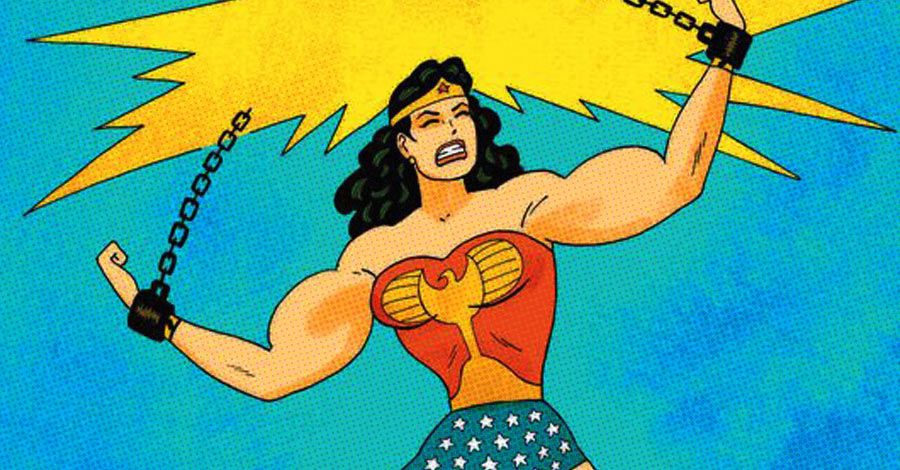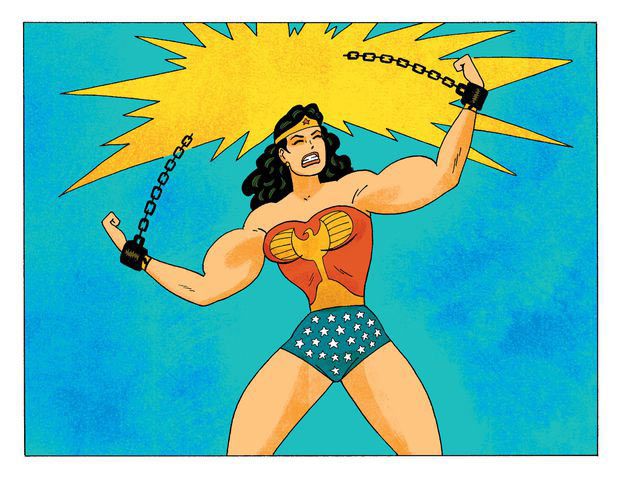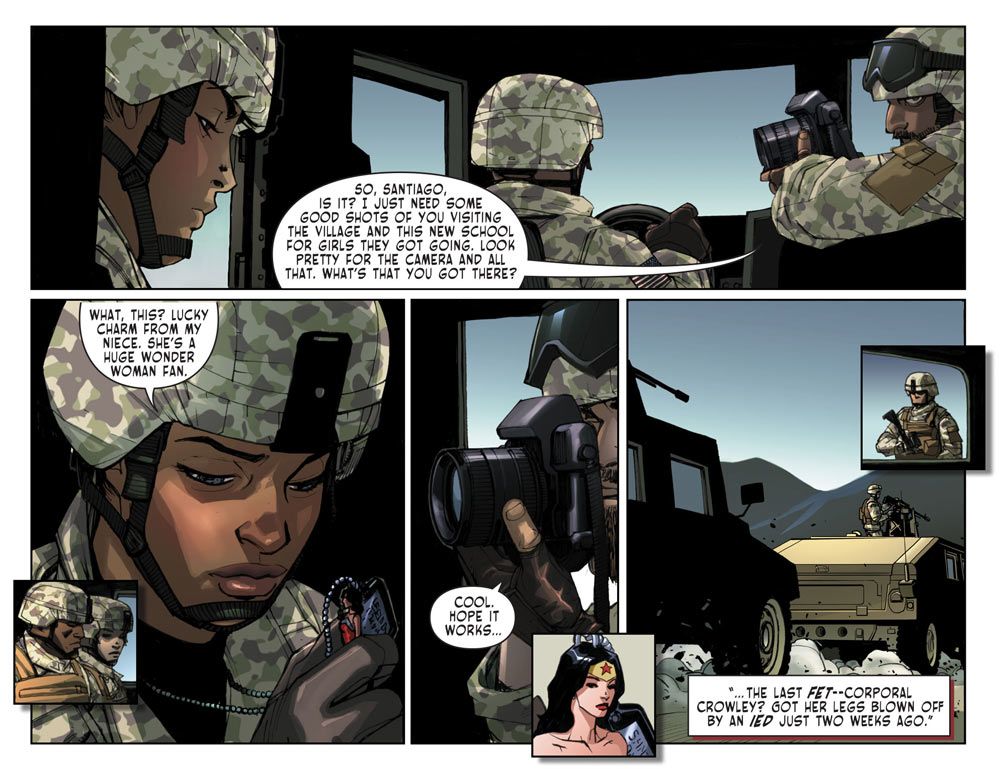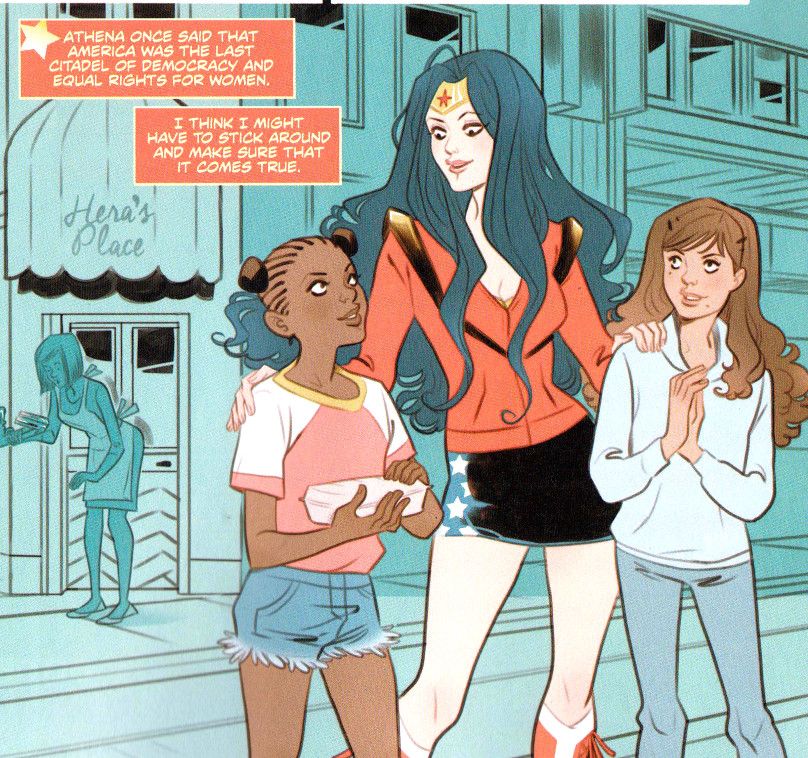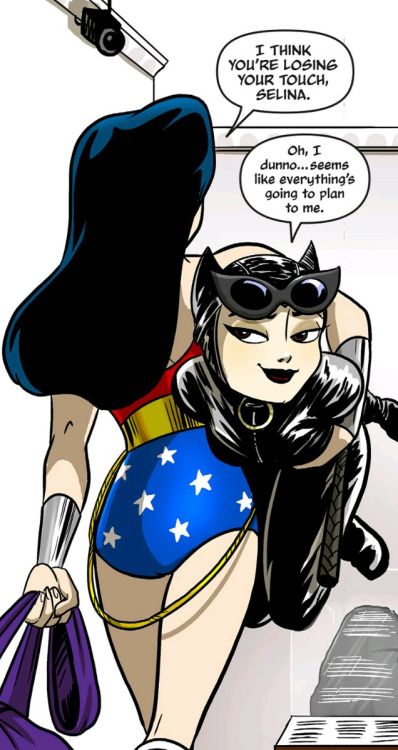2014 saw comic publishers reinvent a number of female characters, from Batgirl through Spider-Woman and even Squirrel Girl. However, perhaps one of the most interesting character experiments in years revolved around one hero in particular: Wonder Woman.
For years, it's been a recurring argument among some fans that Wonder Woman is iconic purely because she was one of the first female superheroes, but "Sensation Comics" has been proving on a weekly basis that there's far more to the character than simply her history. In the digital-first DC Comics series, writers and artists who may not immediately come to mind when thinking of superhero stories have been given the chance to try out new stories and designs for the Amazon, and a whole range of unexpected and terrific stories have come about as a result.
CBR News gathered together just some of the many creators who have tackled the character over the last few months -- Gilbert Hernandez, Amy Chu, Marguerite Sauvage, Ollie Masters, Afua Richardson and Amy Mebberson -- asking each one how they each approached the character, what they believe is the core of the character and what is it about her that makes her an iconic figure? As a result, we've got a look at some of the sides of Wonder Woman you may never have even considered before.
CBR News: Each one of you comes from comic backgrounds that are somewhat afield of superheroes. While she's inarguably a comic book icon, had you read much of Wonder Woman before working on your story?
Gilbert Hernandez: I first read Wonder Woman in the "JLA" comics from that time, and the stories focused more on Wonder Woman as an indispensable teammate and rarely referred to her womanhood. In my story, I wanted to have her act a little more like the original 1940's version because she was so cocky and less surly back then.
Amy Chu: I didn't read much in the way of superhero comics -- I was more of a gamer. But I did read and watch Wonder Woman. As research, I read everything Wonder Woman that time would allow. I really wanted to distill the basic essence of Wonder Woman. I figured lots of other creators would do amazing stories with her character, but since this was a short story, I wanted to focus on what made her inspiring.
Marguerite Sauvage: I haven't read a lot since the Wonder Woman stories when I was a teenager. Luckily, and totally amazingly, I've rediscovered the character through her appearances in "Batwoman" by J.H. Williams III, and then through the Cliff Chiang /Brian Azzarello stories.
Ollie Masters: I'd read a few stories here and there, and her appearances in other titles, but the only run I've consistently read is Azzarello and Chiang's, which I loved. I'm not sure how much it influenced my story, but it definitely gave me a sense of her as a character.
Afua Richardson: I'd only sporadically picked up "Wonder Woman." Don't get me wrong, she's a great character -- an Amazon tempered and weathered by trials to be the people's champion instead of like those who utilize the powers of the gods for their own self-interest. But I am not familiar with who she is outside of always being virtuous.
Amy Mebberson: I am actually not much of a comics reader, generally, but I'm a big fan of the DC Animated Universe canon, especially Bruce Timm's "Batman" and "Justice League" work. Coming from animation myself, I definitely feel more at home with Timm's sleek Diana rather than the steelier comics Wonder Woman.
"Sensation Comics" falls outside of current continuity, and anything can happen in each issue as a result. Why did you choose to tell the story you did?
Chu: That's the awesome thing about "Sensation Comics," right? I wanted to do a story that would be accessible to both old and new readers, entertaining but also hopefully inspiring.
At Baltimore Comic Con, I ran into an old college classmate I hadn't seen in years. He had just returned from Afghanistan where he served as a naval pilot, and he had some great stories to tell, especially about the women who served. I realized I knew embarrassingly little about this, so it really got me interested. This seemed like the perfect setup for a Wonder Woman story, and timely.
Richardson: Each script that I read over seemed to show a different aspect of Wonder Woman. A diplomat, a warrior, and in some cases a peacekeeper. This particular story showed her compassion for someone who'd be considered an arch enemy. That's an incredibly difficult philosophy to take on.
In theory, it sounds quite ethical and moral, but just imagine the person who's done you the most harm in your life, pleading for your help. That's asking a lot! I'm not even sure if I could show that kind of empathy, but I guess that's why they're super heroes -- they remind us to be more than we are capable of perceiving in ourselves.
Hernandez: The story I came up with for "Sensation Comics" was more of a Wonder Woman introduction than an actual grand adventure. It would be a bigger challenge for me to come up with a new adventure that didn't rely on my memories as a child to fuel it.
I chose to set my story in the early 1960s, because that's when I first became aware of the character. Also, in those days Supergirl was still Superman's secret weapon and Mary Marvel was only a legend, so using DC's most powerful female heroines together in a story was a no brainer for me.
Given this chance to work on a story with Wonder Woman, one unconstrained by continuity, what part of the character did you want to focus on, and why?
Sauvage: I may say that what I focused on was quite influenced by the script from Sean E. Williams. The Wonder Woman that popped out in my mind when reading it was a tough and feminine figure, which Wonder Woman obviously is, but very modern and urban, with a mind much closer to a modern Amazon than a muscular warrior.
The design was almost completely to re-invent her look, which was super-great, so I made a mix between two universes I'm totally fond of: the vintage retro style of the "Wonder Woman" TV series incarnated by Lynda Carter, and the style of the Runaways, as in the story she's a rock star. All this was, of course, done in the frame of the character's iconic mandatory details such as colors, stars, bracelets, etc.
Masters: I wanted to do something about her being a hero without an alter-ego. Wonder Woman is something she never stops being -- there's no separation. In my story, even when doing something as normal as going to get her morning coffee, she's wearing her costume under her coat. Not necessarily because she's expecting something to happen, but because the costume, and her identity as Wonder Woman, is like a second skin to her.
Mebberson: Ollie's story had a lighter comedic slant than most WW stories, which I love. I am all about giving strong female characters the opportunity to also be funny, and both Diana and Selena got that chance here.
Did you find it difficult at all to find the core of the character, or did it prove quite easy to define her?
Mebberson: No, not at all. Diana makes a very natural straight woman to Selena thanks to the "dignity" part I mentioned. As I said, I like seeing characters have a chance to show sides they don't get to show while doing their usual "Save The World Fighting!" mode. In this story, Diana has to spit on her hands and swing some weaponry, but she also has a morning routine like everyone else.
Richardson: What makes her so amazing to me is that she's not obsessed with aesthetic or using her looks as a weapon. There is no secret identity. She's steeped in 100% warriorship. She has a code, and she sticks to it. There's no fault or break in her resolve: she just has the strength to do something or she doesn't.
Chu: It's not hard to believe that we all have a little Wonder Woman in us -- that's the message I wanted to bring out.
Has working on the story changed the way you now look at Wonder Woman as a character?
Mebberson: I know what kind of coffee she likes, now!
Chu: I think any time you write a character, whether it's yours or someone else's, you get invested a bit in that character. Sometimes I think as writers and readers we get a little too caught up with continuity trickery. It's always good to step back and think: What is the true essence of someone like Wonder Woman? And that's what I tried to do.
Richardson: It's kind of amazing when you think about it. Here is a woman who doesn't exist other than as an idea in our minds, and yet we've formed a persona for them that we translate into a story in our minds. Through Wonder Woman and popular characters like her, it's as if we have a mutual friend. I'm honored to have the opportunity to interpret such an iconic character. I hope I did her justice!
Masters: Reading all the stories in the "Sensation Comics" anthology has, at least to me, shown her versatility as a character. You have all these different types of story and variations on her but across the anthology she still holds as a character through all the interpretations.
Hernandez: I do think that Wonder wOman still has the potential to be a great role model for young people, the way Spider-Man is for kids these days. Superman might be too super and Batman's nuts, but Wonder Woman is pure focused do-gooderness.
Supergirl and Mary Marvel have those qualities as well, so what are you waitin' for, DC? You got some amazing potential for these iconic creations!

